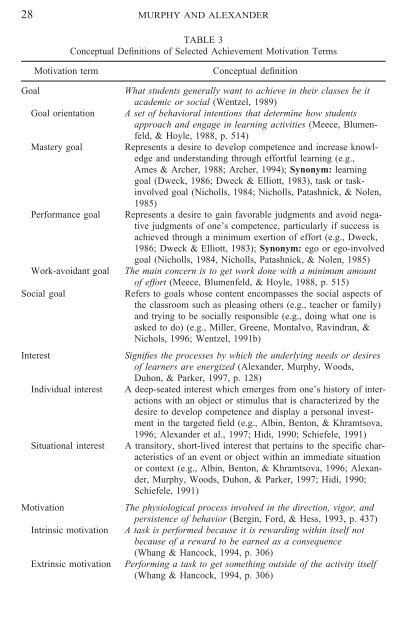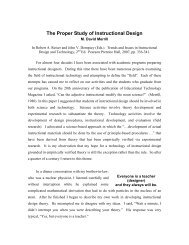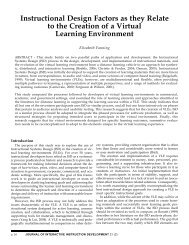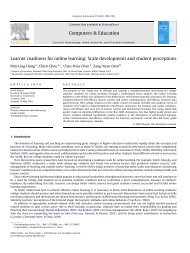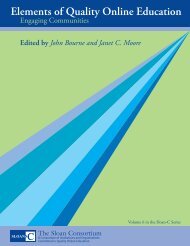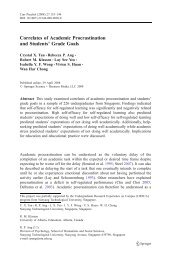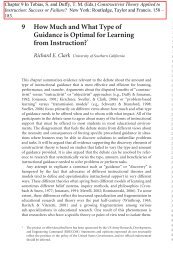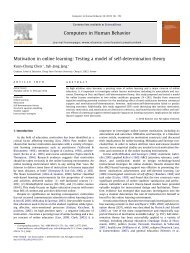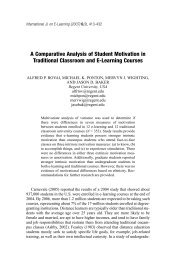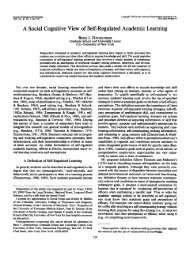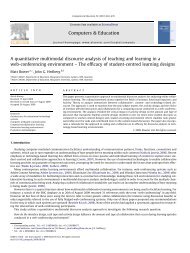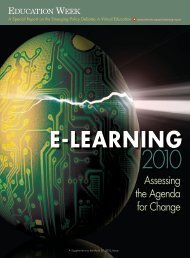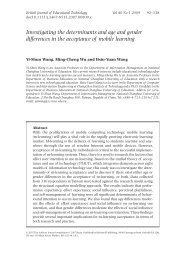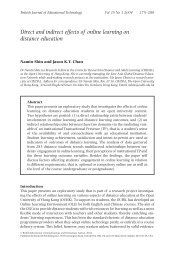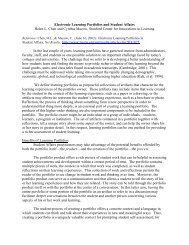A Motivated Exploration of Motivation Terminology - Anitacrawley.net
A Motivated Exploration of Motivation Terminology - Anitacrawley.net
A Motivated Exploration of Motivation Terminology - Anitacrawley.net
You also want an ePaper? Increase the reach of your titles
YUMPU automatically turns print PDFs into web optimized ePapers that Google loves.
28 MURPHY AND ALEXANDERTABLE 3Conceptual Definitions <strong>of</strong> Selected Achievement <strong>Motivation</strong> Terms<strong>Motivation</strong> termGoalGoal orientationMastery goalPerformance goalWork-avoidant goalSocial goalInterestIndividual interestSituational interest<strong>Motivation</strong>Intrinsic motivationExtrinsic motivationConceptual definitionWhat students generally want to achieve in their classes be itacademic or social (Wentzel, 1989)A set <strong>of</strong> behavioral intentions that determine how studentsapproach and engage in learning activities (Meece, Blumenfeld,& Hoyle, 1988, p. 514)Represents a desire to develop competence and increase knowledgeand understanding through effortful learning (e.g.,Ames & Archer, 1988; Archer, 1994); Synonym: learninggoal (Dweck, 1986; Dweck & Elliott, 1983), task or taskinvolvedgoal (Nicholls, 1984; Nicholls, Patashnick, & Nolen,1985)Represents a desire to gain favorable judgments and avoid negativejudgments <strong>of</strong> one’s competence, particularly if success isachieved through a minimum exertion <strong>of</strong> effort (e.g., Dweck,1986; Dweck & Elliott, 1983); Synonym: ego or ego-involvedgoal (Nicholls, 1984, Nicholls, Patashnick, & Nolen, 1985)The main concern is to get work done with a minimum amount<strong>of</strong> effort (Meece, Blumenfeld, & Hoyle, 1988, p. 515)Refers to goals whose content encompasses the social aspects <strong>of</strong>the classroom such as pleasing others (e.g., teacher or family)and trying to be socially responsible (e.g., doing what one isasked to do) (e.g., Miller, Greene, Montalvo, Ravindran, &Nichols, 1996; Wentzel, 1991b)Signifies the processes by which the underlying needs or desires<strong>of</strong> learners are energized (Alexander, Murphy, Woods,Duhon, & Parker, 1997, p. 128)A deep-seated interest which emerges from one’s history <strong>of</strong> interactionswith an object or stimulus that is characterized by thedesire to develop competence and display a personal investmentin the targeted field (e.g., Albin, Benton, & Khramtsova,1996; Alexander et al., 1997; Hidi, 1990; Schiefele, 1991)A transitory, short-lived interest that pertains to the specific characteristics<strong>of</strong> an event or object within an immediate situationor context (e.g., Albin, Benton, & Khramtsova, 1996; Alexander,Murphy, Woods, Duhon, & Parker, 1997; Hidi, 1990;Schiefele, 1991)The physiological process involved in the direction, vigor, andpersistence <strong>of</strong> behavior (Bergin, Ford, & Hess, 1993, p. 437)A task is performed because it is rewarding within itself notbecause <strong>of</strong> a reward to be earned as a consequence(Whang & Hancock, 1994, p. 306)Performing a task to get something outside <strong>of</strong> the activity itself(Whang & Hancock, 1994, p. 306)


